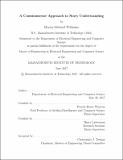A commonsense approach to story understanding
Author(s)
Williams, Bryan Michael
DownloadFull printable version (1.288Mb)
Other Contributors
Massachusetts Institute of Technology. Department of Electrical Engineering and Computer Science.
Advisor
Patrick Henry Winston and Henry Lieberman.
Terms of use
Metadata
Show full item recordAbstract
Story understanding is a essential part of human intelligence. Therefore, any complete model of human intelligence must be able to understand stories. Understanding stories requires commonsense knowledge. Many story understanding systems rely on rules to express and manipulate common sense, but the amount of common sense is vast and expressing significant amounts of common sense this way is tedious. Commonsense knowledge bases can help address this problem. My work demonstrates the power of combining a story-understanding system and a commonsense knowledge base. Genesis is a story-understanding system that models aspects of story understanding by reading and analyzing stories written in simple English. I have extended Genesis by incorporating ConceptNet, a large knowledge base of common sense, into its processing. Now, Genesis not only has access to the dozens of inference rules provided by Genesis users, but also tens of thousands of goal-related assertions provided by contributors to ConceptNet. Genesis uses ConceptNet's knowledge to infer characters' goals, in some cases allowing Genesis to understand stories with few or even zero user-defined rules. Genesis can now infer relevant events and connections never explicitly stated in the story in a manner unprecedented within the space of story understanding and machine reading. Genesis also uses ConceptNet to apply user-defined rules in a commonsense, more flexible fashion, extending the reach of a rule by factors ranging from ten to one hundred. These additions to the Genesis story-understanding system takes steps toward practical AI-enabled systems that provide advice in areas that heavily depend on precedent, including law, medicine, and business.
Description
Thesis: M. Eng., Massachusetts Institute of Technology, Department of Electrical Engineering and Computer Science, 2017. This electronic version was submitted by the student author. The certified thesis is available in the Institute Archives and Special Collections. Cataloged from student-submitted PDF version of thesis. Includes bibliographical references (pages 105-108).
Date issued
2017Department
Massachusetts Institute of Technology. Department of Electrical Engineering and Computer SciencePublisher
Massachusetts Institute of Technology
Keywords
Electrical Engineering and Computer Science.